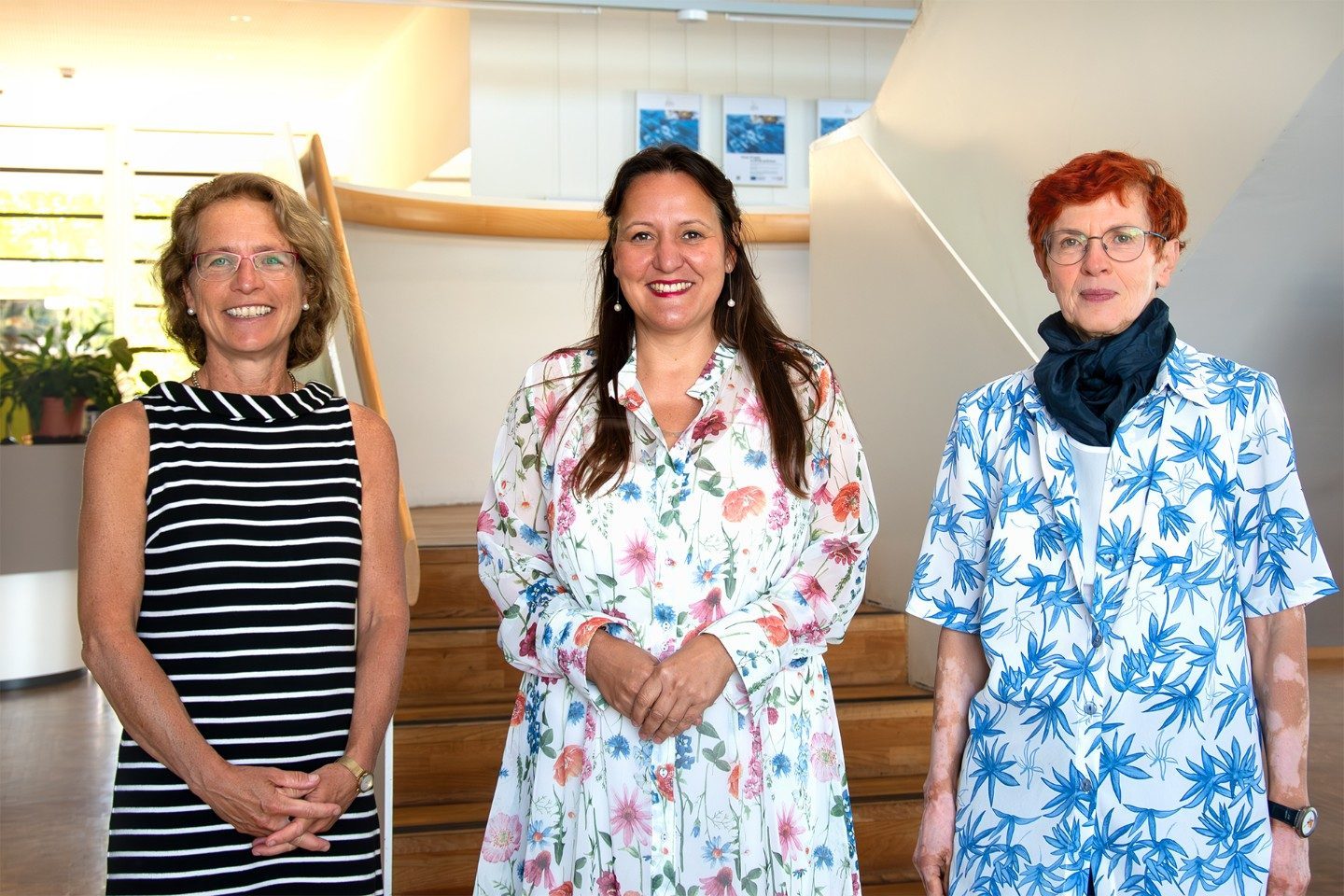
Brandenburg’s Science Minister Schüle Interested in the Future of Fraunhofer ZDD®
Fraunhofer IZI-BB | Potsdam, Sept. 3, 2025 – randenburg’s Minister of Science, Dr. Manja Schüle, visited the Fraunhofer Institute for Cell Therapy and Immunology IZI-BB at Potsdam Science Park today. The visit focused on research projects, partnerships, and future perspectives of the Fraunhofer Center for Digital Diagnostics ZDD®.
Brandenburg as a Healthcare Location Benefits from Fraunhofer ZDD®
During her last visit in the previous year, the Minister emphasized the importance of the Fraunhofer ZDD® for the future of the healthcare system. She pointed out that a large, rural state like Brandenburg would greatly benefit from the digital transformation of medical care.
“At the Center for Digital Diagnostics at Fraunhofer IZI-BB, we are researching future-ready healthcare. One of the innovative solutions developed by the Fraunhofer ZDD, for example, is a wound dressing that shows the progress of healing and transmits the current condition directly to medical staff—quickly, easily, and most importantly, digitally. In a state like Brandenburg, we need practice-oriented, everyday models for the future challenges of our healthcare system. The potential of digital diagnostics in care, diagnosis, and prevention is enormous. And the healthcare sector in Brandenburg benefits in an outstanding way from the research and development results at the ZDD,” reaffirmed Science Minister Dr. Manja Schüle.
Innovation for an Aging Society and Rural Healthcare
In discussions with Prof. Dr. Antje Baeumner, Director of the Fraunhofer IZI-BB, the Minister inquired about the current state of development and how the long-term establishment of the Fraunhofer ZDD® will be ensured so that the expertise and solutions developed can have a lasting positive impact. Prof. Dr. Antje Baeumner explicitly welcomed the visit: “We are very pleased with the Minister’s trust in our work and the support from both federal and state levels. Together, we are working on solutions for medical care in an aging society. These solutions are being developed in collaboration with the healthcare industry and providers. The innovative combination of on-site analytics, intelligent data evaluation, and networked data communication offers highly promising perspectives for a fundamental transformation of healthcare, especially for people in rural areas.”
Political Commitment Ensures Continuity
In medical and pharmaceutical research, development times until market introduction often span 10 to 15 years—far longer than a single legislative period. In this context, continuous political commitment is all the more encouraging and significant, as it ensures that major projects continue to receive support even after their successful initial phases. Minister Schüle’s visit underscores the close cooperation between science and politics, which is of great importance for the future of healthcare in Brandenburg.
The Fraunhofer Center for Digital Diagnostics, founded in 2021, focuses on developing modern, digitally supported healthcare. Its establishment was funded with a total of €30.5 million, of which the State of Brandenburg contributed €4.8 million.
The Fraunhofer Center for Digital Diagnostics ZDD®
The goal of the Fraunhofer Center for Digital Diagnostics ZDD® is to develop technologies and solutions along a digital-diagnostic value chain for decentralized bioanalytical data collection, secure and efficient data communication, and intelligent data interpretation. These efforts aim to combat infectious diseases, immune system disorders, as well as address challenges in veterinary medicine, food safety, and environmental analytics.
The Fraunhofer Center for Digital Diagnostics brings together the expertise of a nucleus of three core institutes:
- the Fraunhofer Institute for Cell Therapy and Immunology IZI in Leipzig,
- the Bioanalytics and Bioprocesses Branch IZI-BB of the Fraunhofer Institute for Cell Therapy and Immunology in the Potsdam Science Park, and
- the Fraunhofer Institute for Experimental Software Engineering IESE in Kaiserslautern.
Beyond its core institutes, the Center can draw on the entire Fraunhofer network when implementing client projects.
With increasing urbanization, modern and cost-efficient healthcare in rural areas requires new solutions, enabled or supported by decentralized and digitally integrated diagnostics. This was powerfully demonstrated by the COVID-19 pandemic. At the same time, it also fostered greater acceptance of online consultations and telemedicine approaches. However, these approaches quickly reach their limits due to a lack of scalability and the absence of diagnostic information in patient histories and therapy decisions. The Center has therefore set itself the goal of closing these gaps with demand-driven solutions and technologies.
In addition to its role in the primary and secondary healthcare markets, the Center is also active in application fields facing similar challenges, such as veterinary medicine, food analysis, and environmental diagnostics.
Furthermore, the Fraunhofer Center for Digital Diagnostics sees itself as a driving force for companies in diagnostics, medical technology, digital health, and health IT, as well as a partner for healthcare providers active in these areas.